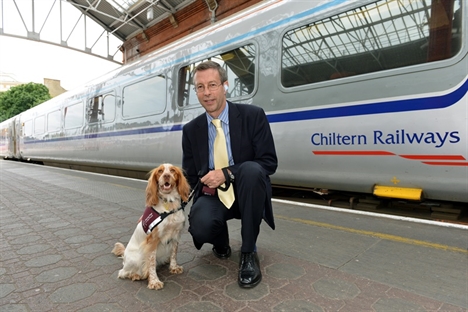01.09.14
Engaging with disability
Source: Rail Technology Magazine Aug/Sept 2014
Rebecca Ward, HR director at Chiltern Railways, explains how disability awareness training for the company’s staff is improving passenger services and experiences.
New staff at Chiltern Railways have been attending training courses to enhance their skills when engaging with disabled customers.
The training, delivered by HearFirst, outlines different areas of disability such as physical disabilities, mental health, learning disabilities, ranges of deafness/communication methods and blindness/partial sight.
Rebecca Ward, HR director at Chiltern Railways, owned by Arriva UK, said: “Chiltern Railways is committed to ensuring our services are as accessible as possible, in particular removing barriers to enable passengers with disabilities to travel more easily.”
Training
The training helps staff understand the barriers disabled people experience when accessing services and learn ways to overcome them.
The training highlights the role that attitudes and perceptions towards disability play in discrimination, and how they might need to be shaped.
Staff are trained in disability etiquette and language issues, the requirements of the Equality Act 2010 and the legal obligations in providing good customer service.
Ultimately, it helps staff make reasonable adjustments to make the railway system usable for disabled people. Ward told RTM: “The course is facilitated by tutors who themselves have a disability. This adds relevance and depth to the training.”
Service excellence
In the latest National Rail Passenger Survey, passengers’ overall satisfaction with Chiltern Railways’ was the highest of any of the traditional franchise operators (scoring 92%), though it was beaten by a number of ‘open access’ operators.
Ward said the training helped achieve the high score. “We want to deliver an incredibly high standard of customer service to every customer. This training supports our staff to deliver the best service they can.”
Julie Ryder, director and founder of HearFirst, said train operators have obligations to provide assistance to passengers with disabilities. She added that it is “reassuring” to see Chiltern Railways investing in this training to help staff understand how to assist a range of passengers, from those who are physically disabled to those who cannot see or hear.
One member of staff said: “The course is highly professional and the trainer’s (Mickey’s) personal experience is invaluable in giving us insight into living with a disability and makes the learning experience very enjoyable and informative.”
Ward, asked whether she believed the disability training should become the industry norm, replied: “We’re always keen to support industry-wide initiatives to make travelling by train as easy as possible.”
Deaf for the day

Chiltern Railways MD Rob Brighouse recently went ‘deaf for the day’ to experience what life was like on board his trains without hearing (see picture above).
As part of the challenge, set by the charity Hearing Dogs for Deaf People, Brighouse had gel moulds inserted into his ears by an audiologist at Specsavers Hearing Centre, which gave him a temporary 60% hearing loss.
He travelled to and from London Marylebone station, quickly learning that he would need to rely on lip-reading to communicate. He struggled with conversations, especially when people turned away whilst talking to him.
He said: “Deafness is an invisible disability and therefore it is impossible to see if somebody is deaf. When I tried to buy a train ticket, I had to repeat myself to the member of staff behind the desk. Once he realised I was deaf, he turned the speaker up to full volume which, although helpful, made it feel like everyone around me was listening in to my conversation and staring at me, which made me feel uncomfortable.”
Everything changed when Brighouse was given hearing dog Rosie, who not only alerted him to important sounds around him, but most importantly she made him feel visible and brought him back into the hearing world.
“Having Rosie completely transformed my situation,” he said. “She wears a burgundy jacket, which made people aware that I was deaf so as well as alerting me to sounds I could no longer hear, Rosie encouraged people to come and talk to me, which is so important when you are feeling isolated. I can only imagine what an amazing support these dogs provide to people with severe or profound hearing loss.”
Although Chiltern Railways has measures in place to accommodate deaf people, such as staff training and visual aids on trains, Brighouse said: “We can support our staff even further with additional training to understand specific challenges deaf people face when using the railway.”
Tell us what you think – have your say below or email[email protected]